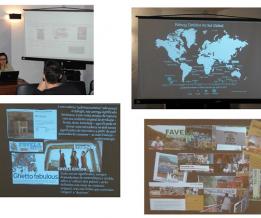scientific diffusion Seminars and Agenda Methods in motion: The transnational Research and its challengues
Methods in motion: The transnational Research and its challengues
METHODOLOGICAL CEM SEMINAR - METHODS IN MOTION: THE TRANSNATIONAL RESEARCH AND ITS CHALLENGES
Overview: There seems to be consensus in the field of urban studies around the heuristic potential of what has been agreed to call “national denaturalization” (See Urry 2008; Sheller 2012) as related research. This seminar aims to reflect on the challenges, the potential and the pitfalls of sociological work dealing with the proper empirical dimension of globalization, seeking to provide an overview of their research designs, as well as their methods of collecting and interpreting data.
About the lecturer: Bianca Freire-Medeiros, professor at the Sociology Department of the University of São Paulo (USP) and coordinator of URBANDATA - Brazil (database on Urban Brazil). Dr. Freire-Medeiros received her Social Sciences degree from UERJ, a degree in Urban Sociology at the same university, and a Masters in Sociology at IUPERJ. Her doctorate was in History and Theory of Art and Architecture (University of Binghamton, NY). As a teacher and researcher, she has sought to consolidate the so-called paradigm of the New Mobility from, above all, the dialogue with the group of researchers who gravitate around the CeMoRe (Center for Mobilities Research, Lancaster University), where she conducted her post-doctoral training, with John Urry as her advisor.
POST-EVENT
The last event of the Methodological CEM series in the first half of 2016 received the Professor Bianca Freire-Medeiros, from the Sociological Department at USP. She gave a lecture about “Moving Methods: transnational research and its challenges,” related to her investigations and her research networks on issues related to poverty, segregation and slums in Brazil (Rio de Janeiro), South Africa and India. Thus, based on the new paradigm of mobility and critical sociology, Medeiros discussed the discursive articulations employed by social actors involved in the marketing of these areas (tourist market: slums/shanty towns/townships and excursions paid to locations associated with poverty and segregation) to legitimize actions that, as a rule, are targets of moral judgments. She also discussed issues related to ethnographic research within this universe.




